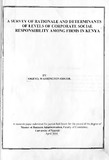| dc.description.abstract | This research examined the levels of involvement in Corporate Social Responsibility (CSR) and rationales and
factors that determine these levels among firms in Kenya. The period of research was 1997 - 2001 using a
questionnaire on a sample of eighty three firms out of which fifty nine responded. Forty of the respondents had
complete data while nineteen had only CSR data. Of the forty, twelve were listed in the Nairobi Stock Exchange,
twenty eight were non-listed, twenty seven were multinational subsidiaries and thirteen were fully local firms.
A significant number, three quarters (%), of the firms in the study were found to exhibit levels of involvement
greater than fifty percent (50%) which suggests that majority of the firms involved themselves in CSR activities
during the period. As for rationales, four were found to have very high ratings. These were "use of CSR as a longterm
strategy", "use of CSR to achieve high public visibility", "use of CSR as a competitive strategy" and
"engagingin CSR as a concern to the society". These were therefore the dominant rationales that influenced firms
in Kenya to engage in CSR activities in the study period.
The correlation analysis results showed that company size, average profitability, industry sector, business risk,
management style, average growth, listing status, and multinational status all had some association with CSR
level of involvement. Out of these factors, average profitability, industry sector, multinational status, and
management style consistently exhibited very strong and positive association with the CSR variable. This
suggests that these three factors were the stronger determinants of levels of involvement in CSR activities in most
firms during the period. Listing status on the other hand had smaller correlation .coefficients making its
association with CSR weak. Further, company size, business risk, and average growth all exhibited negative and
weak association with CSR involvement indicating an inverse relationship with CSR. This inverse relationship
could suggest that perhaps firms with these in these categories may be having other marketing drivers or market
niches that are different from CSR.
This research therefore found that firms in Kenya exhibited high levels of involvement in CSR. The decisions
about these high levels of involvement were mainly driven by "use of CSR as a long-term strategy", "use of CSR
to achieve high public visibility", "use of CSR as a competitive strategy" and "engaging in CSR as a concern to
the society", As for determinants of CSR involvement, the dominant ones were found to be average profitability,
industry sector, and management style. | en |

